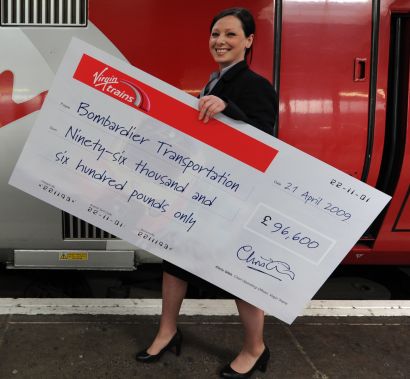HUNDREDS of early-afternoon passengers packed the concourse at London Euston on Tuesday 21 April, delayed by signalling failure on the West Coast main line’s recently upgraded Trent Valley route.
It was a scene unlikely to impress Virgin Trains chief operating officer Chris Gibb, who was at Euston to hand over a ceremonial £96,600 cheque to Bombardier Transportation’s UK chairman Colin Walton in recognition of the trainbuilder’s early completion of an £8.5 million refresh and re-marshalling of Virgin Train’s 21 Super Voyager diesel trains, which have become increasingly integrated into the West Coast fleet.
With Virgin Trains’ performance at 53 per cent, and a predicted “horrendous” evening peak to come, Network Rail’s director of operations and customer service Robin Gisby was calling it “a rough day”.
But he insisted that infrastructure performance has been improving steadily since a succession of overhead line problems early in the year, and that the company is determined to improve further.
“We have worked closely with component manufacturers to get on top of axle counter reliability problems, and performance has improved significantly during the past couple of months. The infrastructure is settling down well, and we are determined to maintain improvement, day by day and week by week.”
Mr Gisby talked to Railnews soon after Chris Gibb had revealed the new built-in benefits of Virgin’s 21-strong Super Voyager fleet.
“The Super Voyagers form 30 per cent of our total fleet, and the refurbished sets have become increasingly interchangeable with our Pendo-linos on the West Coast route to the benefit of customers,” said Mr Gibb.
“Many more of our train teams are trained to work both types, which means we can ‘mix and match’ far more effectively to respond to customer demand on all our services.”
The 18 five-coach and three four-coach Super Voyagers have had the Shop vehicle moved conveniently next to the first class accommodation, creating a ‘hybrid’ coach with seating in bays of four, new laptop-friendly tables and revised seat cushions and backrests.
On busy peak-time trains, this coach can be readily used to provide additional first class accommodation, with the normal on-board offer provided.
“The refurbished trains complement our ongoing massive investment to improve other aspects of our service,” said Mr Gibb. “Depot expansion is helping us improve toilet discharge and consequent reliability, all Pendolinos are now wi-fi enabled, with Super Voyagers soon to follow, and our new on-board catering is proving a hit with customers and staff.”
He puts staff enthusiasm down to their involvement in menu and service planning from day one, as well as with the Super Voyager alterations.
“We have listened to their ideas on what would and would not work, and taken on board their suggestions,” he said. “They therefore feel rightly proud of the new service, and go all out to make it work, despite coping with increased services and decreased journey times.”
Mr Gibb also spoke exclusively of continuing infrastructure problems on the West Coast route following its £9 billion upgrade.
While he acknowledged that there had been improvement – as well as the help received from Network Rail in running 15-car Super Voyager formations over diversionary routes to beat engineering blockades – he said he felt let down by a catalogue of infrastructure failures of which
his passengers are all too painfully aware.
“We need considerably more improvement to get our regular performance percentage back into the high nineties we achieved at the start of our new timetable,” he said. “Our staff and trains are performing well, so let’s equal that with high-performing infrastructure.”
Refreshed – but Super Voyagers still face West Coast struggles
7th May 2009


